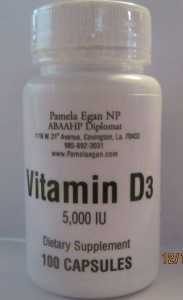By: Pamela Egan, NP
Science Confirms Vitamin D3 Helps Lower Mortality Rate
July 20, 2011 – For years now, I have been telling everyone I know about the life-saving health benefits of vitamin D3. The number of vitamin D3 articles on this website should offer some indication of this author’s perception of how important the nutrient is to overall health.
Apparently, the message has been sinking in with the readers of this site, as four of the top six most-read articles in the history of this website are about vitamin D3. Unfortunately, the same cannot be said for health bloggers, some of whom continue to insist that there is practically no difference between D2 (ergocalciferol) and D3 (cholecalciferol) in terms of the health benefits offered by each.
 Earlier this month, a new scientific review was published that could put an end to the debate once and for all. The review of 50 clinical trials involved a total of 94,000 elderly adults, most of whom were women. The report, which appeared in the July issue of the Cochrane Database of Systematic Reviews, showed that those elderly adults who were given vitamin D3 supplements were six percent less likely to die than those who were not administered the vitamin. That means that vitamin D3 helps lower mortality rates in elderly women.
Earlier this month, a new scientific review was published that could put an end to the debate once and for all. The review of 50 clinical trials involved a total of 94,000 elderly adults, most of whom were women. The report, which appeared in the July issue of the Cochrane Database of Systematic Reviews, showed that those elderly adults who were given vitamin D3 supplements were six percent less likely to die than those who were not administered the vitamin. That means that vitamin D3 helps lower mortality rates in elderly women.
The truth is that there is a better-than-good chance the vitamin would have the same preventive effect on men who supplemented daily for two yearsl, although the study stopped short of stating as much.
Interestingly enough, the report other forms of vitamin D including vitamin D2 and the active metabolites alfacalcidol and calcitriol had zero impact on mortality rates. This confirms what this website and this author have been reporting since at far back as 2007 — vitamin D3 is a vastly superior form of the nutrient to D2, and that anyone supplementing with the nutrient should make sure they are getting the former and not the latter.
Vitamin D3, or cholecalciferol, is the form of the vitamin already synthesized by the body. D2 is a manufactured compoud and is only found in supplements and foods enriched with supplements. As has been periodically reported here over the past five years, vitamin D3 has far superior bioavailability than D2.
The study arrived at a number of predictable conclusions, including that the vitamin D3 supplements had a more profound positive impact on individuals who were vitamin D deficient prior to the study.
Vitamin D deficiency has been linked to increased odds of developing and/or the worsening/progression of over 30 diseases, including multiple forms of Cancer, ADHD, Alzheimer’s, Autism, Fibromyalgia, Multiple Sclerosis, AIDS, Allergies, Depression, Parkinson’s, Ricketsl, the Flu, H1N1, Autoimmune Disorders, Childhood Obesity, Osteoporosis, Chronic Pain, Asthma, Tooth Loss, Gingivitis, Arterial Stiffness, Type 2 Diabetes, Metabolic Syndrome, Heart Disease, Hypertension, High Cholesterol, Chronic Fatigue Syndrome, Lupus, Psoriatic Arthritis, Lung Transplant Rejection and possibly premature balding.
Neither the studies nor the review offered any insights into why specifically vitamin D3 reduced mortality rates in the elderly women studied, opting instead for the obligatory ‘more research is needed (as is more funding)’ statement when assessing the possible reasons why D3 appears to help people live longer. However, given the above list of diseases, illnesses and various other health maladies, it’s safe to say that the prevention of disease, bolstering of the immune system and strengthening of the bones probably have something to do with it.
Predictably, the media went out and found a skeptical doctor who seemingly bases her beliefs on blind faith rather than science. JoAnn Manson, MD, DrPH, of Brigham & Women’s Hospital in Boston, wasted no time in putting her foot in her mouth. “Vitamin D is not ready for prime time in terms of preventing mortality,” she said. “More research is needed to disentangle the effects of vitamin D from calcium.”
Some people simply refuse to see the forest for the trees.
The lead scientist who spearheaded the review was Goran Bjelakovic, MD, of the University of Nis in Serbia.
Video: Vitamin D May Improve Survival in Elderly Women
Pamela Egan, NP, ABAAHP Diplomat American Board of Anti-Aging Health Practitioner Board Certified Adult & Family Nurse Practitioner Clincal Specialist Gerontology/Mental Health) Certified Diabetes Educator Egan Wellness Clinic/ Anti-Aging & Skin Care Spa 1116 West 21st Ave. Covington, LA 70433 985-892-3031 www.pamelaegan.com
Related Articles:
- – Vitamin D3: Are You Getting Enough?
- – Vitamin D3 may help lower blood pressure and cholesterol
- – Experts call for increased dosages of Vitamin D3
- – Vitamin D3: The Miracle of Sunshine
- – Vitamin D3 Sources
- – Side effects of Vitamin D3
PamelaEgan.com > Health Articles > Nutrition – Disease – Women’s Health



